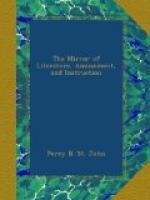[8] Eginhard, in Vit. Car. Mag. cap. xxii. Marquhard Freher, de Statura, Car. Mag. The dissertation of Marquhard Freher on the height of Charlemagne, (and on the question whether he wore a beard or not,) does not satisfy me as to his precise stature. Eginhard declares that he was in height seven times the length of his own foot, which we have every reason to believe was not very small, at least if he bore any resemblance to his mother, who was known by the name of “Bertha with the long foot.”
Gifted with a frame, the corporeal energies of which required little or no relaxation, and which, consequently, never clogged and hampered his intellect by fatigue, Charlemagne could devote an immense portion of his time to business, and, without taking more than a very small portion of sleep, could dedicate the clear thoughts of an untired mind to the regulation of his kingdom, even while other men were buried in repose. He was accustomed, we are told, to wake spontaneously, and rise from his bed four or five times in the course of each night; and so great was his economy of moments, that the brief space he employed in putting on the simple garments with which he was usually clothed, was also occupied in hearing the reports of his Count of the Palace, or the pleadings of various causes, which he decided at those times with as much clear wisdom as if listening to them on the judgment seat.
Some lighter exercise of the mind was nevertheless necessary even to him; but this was principally taken during his repasts, when he caused various works to be read to him, which did not require the severe attention that he was obliged to bestow on judicial investigations. The subject of these readings was, in general, the history of past times, and works, upon theology, amongst which the writings of St. Augustin are said to have afforded him the greatest pleasure.
By the constant employment of moments which would otherwise have been wasted to the intellect, an extraordinary mass of business was easily swept away; and, at the end of the very year in which he returned from Italy, a number of acts, diplomas, charters, letters, judgments, and affairs of all kinds, can be traced to Charlemagne himself, the despatch of which, together with all those that must have escaped research, would be utterly inconceivable, were we ignorant of what were the habits of that great and singular man.
The war dress of Charlemagne himself was wholly composed of steel, consisting of the casque, breast, and back plates, together with greaves, gauntlets, and cuissards, formed likewise of iron plates. Nor were inferior warriors less cumbrously defended; for though the arms of the earlier Francs were light, in comparison with this heavy panoply, yet we find that, in the days of Charlemagne, each man in the army, whose means permitted it, was protected by a suit of armour similar to to that of the monarch.
[Mr. James’s summary of the character of Charlemagne is a delightful piece of writing:]




